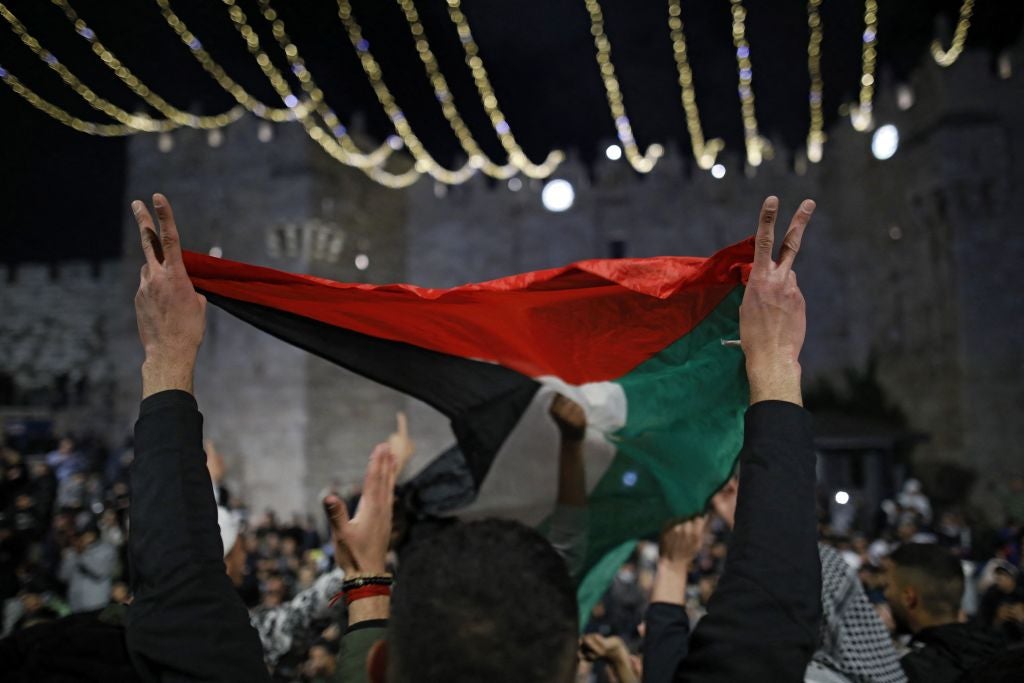Youth-led protests can make a difference for Palestinians
Collective action in Jerusalem shows the importance of grassroots mobilisation


Much has been written about clashes and violence around Jerusalem’s Damascus Gate over the last few weeks, but as a lifelong city resident, I have a unique vantage point on the youth who live in and around the Old City.
Key to any real understanding of the events is an understanding of the deep relationship that exists between Palestinian residents of the Old City and the public space surrounding their homes – it’s a unique type of relationship that even Palestinians living outside its walls often underestimate.
Beyond the obvious religious and national responsibilities felt by Old City residents towards their ancient hometown, they see the public spaces of the Old City as their own back gardens, where they hang out in terrace spots and on their beautiful balconies late into the summer nights.
Jerusalem is a city like no other, recognised as a Unesco World Heritage site it juggles a number of world interests.
The streets are narrow, Old City houses are crowded, with few building or renovation permits granted to Palestinian residents. This explains why families (and the youth in particular) flock to the expansive Damascus Gate for space. Throughout my life, and more so for the last several years, Damascus Gate (or Bab al-Amoud as we call it), has become the social hub where people gather – the youth smoke, eat sweets, and catch up.
Over the years, the amphitheatre-esque square has become a stage for cultural performances including musical events, street art, traditional dance, even parkour.
This all changed on the first day of Ramadan this year when Israeli authorities blocked people from congregating around the large stairs (known to locals as the "chairs") with metal barriers, and only allowing narrow walking access through the small steps. Young Palestinians considered this a provocation, and staged nightly protests to reclaim the space.
There was a growing level of determination, and a commitment to peaceful demonstration. After a few days of cynicism, the wider Palestinian community quickly embraced the young people's plight. Their demands were crystal clear – to remove the barriers from around the large stairs and to open the seating area.
The Israeli police tried at several points to persuade the youth to accept the closure of the stairs, to no avail. It was a remarkable moment when there came the realisation that there was actually no leader for this movement, and no political party or leaders involved.
Of course, despair, hopelessness, and the growing feelings of oppression and discrimination are all contributing factors to the anger fuelling this cycle of confrontation. The tipping point came, however, when ultra-nationalist Jewish groups gathered and marched, chanting “death to Arabs”, before clashes broke out the streets of Jerusalem in full view of Israeli forces.
On 22 April things came to a head. Around 120 Palestinians were injured over the course of one night. With protests continuing and escalating. Two days later, on the Sunday evening, the police decided to remove the barriers and open up the Damascus Gate stairs.
Jerusalemites of all ages and backgrounds flocked to the square to mark a rare night of success and celebration. It was a small victory, but 13 nights of continued demonstrations had finally paid off, and the most important social space for Palestinians in the city was finally open again.
At the time of writing, this story remains unfinished – Israeli forces continue to deploy in large numbers around Damascus Gate, and tension is thick in the air.
In confronting Israel’s policies via protest – and in contrast to the blocked path towards Palestinian elections – the Jerusalemite youth are presenting another model of leadership and mobilisation, through spontaneity, communal and social participation.
Mahmoud Muna is a Palestinian cultural leader, known to many as the bookseller of Jerusalem

Join our commenting forum
Join thought-provoking conversations, follow other Independent readers and see their replies